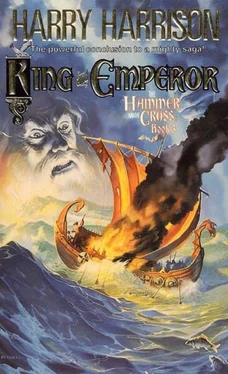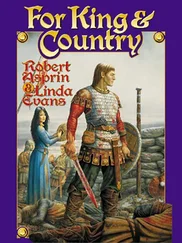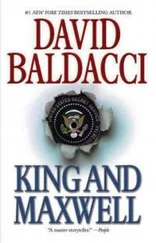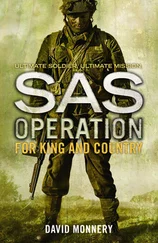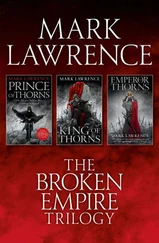Harry Harrison and John Holm
King and Emperor
Stamford—March, Anno Domini 875
“Just a village,” they said. “A few huts by the roadside. Capital of the North! It's not even Capital of the Fen. Never been anything, never will be.”
The inhabitants of Stamford, both the old ones and the many more numerous incomers, bore the taunts of their neighbors easily. They could afford to. For whatever its history, whatever its native merit or lack of it, Stamford was now chief residence of the King of the North, once a co-king, once a jarl, before that a mere carl of the Great Army now destroyed, before that, almost, a thrall in a fenland village. Now they called him the One King, for so he had proved himself, and to his name and title, King Shef, his Norse subjects added the nick-name Sigrsaell , his English ones, with the same meaning and in almost the same word Sigesaelig : the Victorious. Truly he was a king who ruled by his word alone. If he declared humble Stamford the Capital of the North, then so it must be.
After his now-legendary defeat of the Ragnarsson brothers in the great battle of the Braethraborg in the year 868 of the Christians' count, that itself following on his defeat of the King of the Swedes in single combat at the Kingdom Oak of Uppsala, Shef the One King had received the submission of all the petty kings of the Scandinavian lands, of Denmark, Sweden and Norway as well. His fleets filled by levies from his under-kings, prominent among them Olaf of Norway and his own comrade Guthmund of Sweden, he had returned with massive force to the island of Britain, regaining power not only over the kingdom of the East and Middle Angles which he had been granted previously, but rapidly overawing also the petty rulers of Northumbria and the southern shires, and after them exacting submission further from the Scots, the Picts and Welsh. In the year 869 King Shef had launched the great circumnavigation of the island of Britain, which set out from the port of London, cruised to the north along the English and Scottish coasts, descended like a cloud on the disbelieving pirate-jarls of the Orkneys and Shetlands, left them chastened and afraid, and then turned south and west again through the many islands of the Scots and down the lawless western coasts to Land's End itself. Only there did it recognize friendly power, sheathe its talons, and sail east in company with the escort-ships of Alfred, King of the West Saxons, till it reached home harbor once more.
Since then the inhabitants of Stamford could boast that they sheltered a king whose power was uncontested from the westernmost isle of Scilly to the tip of the North Cape itself, two thousand miles north and east. Uncontested and—most said—shared only in theory with King Alfred, whose narrow boundaries King Shef persistently continued to honor, in obedience to the agreement of co-kingship the two had entered into in dark days of threat almost ten years before.
What the inhabitants of Stamford could not say, and did not care to think about, was why the greatest king the North had known since the times of the Caesars should make his home in the rural mud of Middle Anglia. The king's advisers had said the same thing, many times. Rule from Winchester, some said, to be frowned down by an angry one-eyed stare: for Winchester remained the capital of Alfred and the South. Rule from York, suggested others, from the stone walls that the king himself had stormed. London, said others, long a wretched backwater without a king or a court to fill it, but now increasingly the rich center of trade from the fur-lands of the North to the vineyards of the South, crowded with ships carrying hops, honey, grain, leather, tallow, wool, iron, grindstones and a thousand luxury goods: all paying toll to the officers of the co-kings, Shef's on the north bank and Alfred's on the south. No, said the many Danes among his counselors, rule from the ancient stronghold of the Skjöldung kings, from Hlethraborg itself, for it is the center of your dominions.
The king rejected them all. He would have chosen a town in the fenlands themselves if it had been possible, for he was a child of the fens. But much of the year Ely stood inaccessible in the swamp, and Cambridge little better. In Stamford he was at least on the Great North Road of the Romans, now relaid with hard stone on his own instructions. It was there, he declared, that he would set the Wisdom-hus , the House of Wisdom, that would be the central achievement of his rule: the new College of the Asgarth-Way, not replacing but overshadowing the old one at Kaupang in Norway. There all priests of the Way would be welcome, to teach their crafts, to learn crafts from others.
It was part of the Wayman law that all priests should pay their way by work, not living from tithes and soul-taxes like the priests of the Christians. Nevertheless the king had given to the College a skilled reckoner, once a Christian priest himself, Father Boniface, to give money to any Way-priest for his own support, such money to be repaid when convenient in work, in knowledge or in good silver. From all over the north priests came, now, to learn the craft of milling, by watermill or windmill, and dispersed again, taking with them the knowledge of how to grind corn, but also how to beat out iron with powered trip-hammers and draft-bellows, how to adapt the new power to many tasks once carried out by slave-muscles alone. Father Boniface, by the king's permission but without his direct knowledge, often lent money to such visitors in return for a share of the profits of some new mill for five, ten or twenty years into the future.
The silver that flowed into the coffers of the king, and the coffers of the Way, would once have brought ten thousand Vikings on the trail of loot. But across the North there were now not even many bearded corpses dangling on coastal gibbets as a warning to their kind. Royal warships patrolled the seas and the port-approaches, the few towns and fjords that kept to their old piratical customs were visited one after another by overwhelming fleets drawn from the powers of too many sub-kings to resist.
What Stamford did not know, did not wish to know, was that its very insignificance and lack of history had been a recommendation to the king. He had said in the end to the chief of his advisers, Thorvin priest of Thor, whom he had set over the College as its director: “Thorvin, the place for new knowledge is somewhere where there is no old history, no old tradition for people to imitate and follow and misunderstand. I have always said that as important as new knowledge is old knowledge which no-one has recognized. But worse than anything is old knowledge which has become holy, unquestioned, so well known to everybody that no-one thinks about it any more. We will begin again, you and I, somewhere that no-one has heard of. Where there will be no stink of ink and parchment in the air!”
“There is nothing wrong with ink and parchment,” Thorvin had replied. “Or vellum for that matter. The Way has its books of holy songs. Even your steelmaster Udd has learnt to write down what he knows.”
The King frowned, reconsidering what he meant. “I have nothing against books and writing, as a craft,” he said. “But folk who study books alone come to think there is nothing in the world outside them. They make book into Bible, and that is old knowledge become old lore. I want new knowledge, or old knowledge recognized. So here in Stamford at the House of Wisdom we will establish this as a rule. Anyone, man or woman, Wayfolk or Christian, who brings us new knowledge or shows us some new and useful way to use old knowledge, will be better rewarded than they would be for years of toil. Or years of Viking robbery. I want no more Ragnarsson heroes. Let people show their courage some other way!”
Читать дальше
